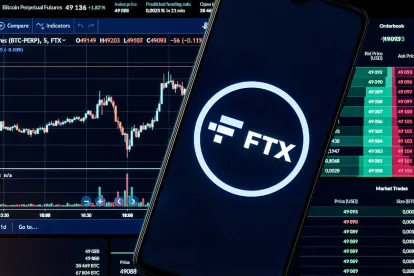The crypto winter is starting to look more like a crypto ice age. In addition to hundreds of billions of dollars in lost market value, the crypto industry has seen major industry players seek protection in bankruptcy court, with the recent FTX bankruptcy only the latest in a string of high profile bankruptcies this year. The fallout from these bankruptcies and the crypto “ice age” is likely to reshape the industry and spur a new wave of legal and regulatory scrutiny.
FTX: From Bad to Worse
As October 2022 ended, the FTX companies were among the most admired of cryptocurrency businesses. FTX was the world’s second largest crypto exchange and the white knight who had just been approved to buy the assets of Voyager Digital out of Chapter 11 bankruptcy. The founder and CEO of FTX, Sam Bankman-Fried, was a multi-billionaire and active political donor.
The breadth and speed of the collapse that followed were breathtaking. It started (in public) on November 6, 2022, when Binance, the world’s largest crypto exchange and an early investor in FTX, let it be known that it was liquidating its substantial holdings in FTT (FTX’s proprietary digital token). A classic “run on the bank” followed. On November 8, 2022, FTX paused customer withdrawals, but said the pause would only be temporary because Binance would acquire some of the FTX companies and inject liquidity. The very next day, however, Binance announced that what it discovered in less than 24 hours of due diligence was enough to make it abandon the acquisition because FTX’s issues were beyond Binance’s ability to help. Two days later, on the federal Veterans Day holiday, Bankman-Fried (his fortune apparently wiped out) resigned as CEO, and within hours FTX filed Chapter 11 bankruptcy.
Typically, the Chapter 11 filing of a major business features a large number of “first day motions” filed with the petition to make sure a debtor can use its cash for its business going forward and can pay critical pre-petition debts, such as the wages of its employees. Not so with FTX. No motions at all accompanied the FTX petitions. The motions that did come on November 14, 2022, were procedural, seeking joint administration of the cases of the 134 FTX debtors and relief from other general court requirements regarding creditor lists and service. Revelations over the ensuing days and weeks have placed FTX’s skeletal filing in context: a cyberattack on the day it filed bankruptcy, more than $1 billion in missing assets, reports of unauthorized withdrawals of hundreds of millions of dollars of crypto assets, compromised systems integrity, lack of corporate controls, untrustworthy financials, and an emerging (and still evolving) turf war between the Chapter 11 bankruptcy estate and Bahamian liquidators.
Other Industry Bankruptcies
Cryptocurrency exchanges Voyager Digital and Celsius Network both filed Chapter 11 in July 2022. Their cases feature a wide array of issues still in need of resolution, including determinations regarding cryptocurrency ownership, and claims arising from intercompany transfers. These issues will loom even larger in the bankruptcy of FTX, a much bigger company with 134 separate debtors and insolvency proceedings playing out both in the United States and abroad. FTX’s implosion is already impacting other beleaguered crypto companies, including BlockFi, which filed for Chapter 11 bankruptcy (as well as a liquidation proceeding in Bermuda) on November 28, 2022, after reporting significant exposure to FTX.
Takeaway
The recent spate of crypto-related bankruptcies underscores the significant risk to consumers and brands in this rapidly-evolving industry. It is also likely to increase calls for new laws and regulations to better protect industry participants from fraud and abuse. Companies and investors considering crypto-related opportunities should carefully evaluate potential partners to ensure they have robust legal and corporate compliance processes in place, while companies with exposure to these or other crypto-related bankruptcies should consult a bankruptcy attorney. The ArentFox Schiff Bankruptcy practice group and Metaverse, Blockchain and Digital Assets industry group are closely monitoring these matters and stand ready to help clients through them.
Crypto & Blockchain Bankruptcy
The recent spate of crypto-related bankruptcies underscores the significant risk to consumers and brands in a rapidly evolving industry.





 />i
/>i

